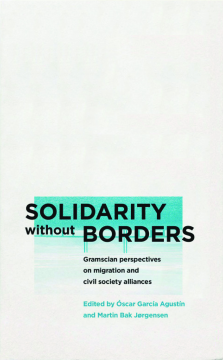
Additional Information
Book Details
Abstract
Solidarity without Borders reads the micropolitics of migrants as political actors within a Gramscian context by observing alliances between migrants and trade unions, worker organisations and other radical constituencies.
This book argues for Gramsci’s theory of the formation of a transnational counter-hegemonic bloc, by studying methods of modern resistance and new forms of solidarity between these forming groups. With case studies of the Gezi Park Protests in Turkey, social movements in Ireland and the Lampedusa in Hamburg, the authors consider how diverse new migrant political actors, newfound cross-border alliances, and spaces of resistance shape the political dimensions of protest.
As migrants are often deprived of agency and placed outside the mobilisations taking place across Europe, Solidarity without Borders demonstrates how new solidarity relations are shaped and how these may construct a new common ground for struggle and for developing political alternatives.
'Theoretically innovative and empirically rich, this volume helps addressing fundamental questions about the creation of spaces of resistance by building upon Antonio Gramsci's reflections on the Southern question'
Donatella Della Porta, Professor of Sociology, Department of Political and Social Sciences, European University Institute
'This book's Gramscian perspective provides a welcome corrective to nationalist migration scholarship that naturalises borders and a migrant/native divide'
Nina Glick Schiller, Emeritus Professor, Social Anthropology, University of Manchester and Max Planck Institute for Social Anthropology
Table of Contents
| Section Title | Page | Action | Price |
|---|---|---|---|
| Cover | Cover | ||
| Contents | v | ||
| Series Preface | vii | ||
| Preface and Acknowledgements | x | ||
| Introduction | 1 | ||
| 1. Solidarity without Borders: Gramscian Perspectives on Migration and Civil Society Alliances - Óscar García Agustín and Martin Bak Jørgensen | 3 | ||
| Part I: The Heterogeneity of Political Actors | 21 | ||
| 2. Gramsci's 'Philosophy of Praxis' and the Topic of Migration - Ursula Apitzsch | 23 | ||
| 3. Countering Hegemony through a Park: Gezi Protests in Turkey's Migrant Neighbourhoods - Nazlı Şenses and Kıvanç Özcan | 40 | ||
| 4. Gramsci in Slices: Race, Colonialism, Migration and the Postcolonial Gramsci - Miguel Mellino | 58 | ||
| Part II: Solidarity and Alliances | 77 | ||
| 5. Political and Social Alliances: Gramsci and Today - Derek Boothman | 79 | ||
| 6. Gramsci, Migrants and Trade Unions: An Irish Case Study - Mary Hyland and Ronaldo Munck | 95 | ||
| 7. The Southern Question and the Irish Question: A Social Movement Perspective - Laurence Cox | 113 | ||
| Part III: Avoiding Misplaced Alliances | 133 | ||
| 8. Hegemony, Migration and Misplaced Alliances: Lessons from Gramsci - Peter Mayo | 135 | ||
| 9. For the Sake of Workers but Not Immigrant Workers? Social Dumping and Free Movement - Óscar García Agustín and Martin Bak Jørgensen | 150 | ||
| Part IV: Spaces of Resistance | 167 | ||
| 10. Politicising the Crisis: The Southern Question, Uneven Geographies and the Construction of Solidarity - David Featherstone | 169 | ||
| 11. Contesting Urban Management Regimes: The Rise of Urban Justice Movements in Sweden - Lisa Kings, Aleksandra Ålund and Nazem Tahvilzadeh | 186 | ||
| 12. Spaces of Resistance and Re-Actuality of Gramsci in Refugees' Struggles for Rights? The 'Lampedusa in Hamburg' between Exit and Voice - Susi Meret and Elisabetta Della Corte | 203 | ||
| Conclusion | 221 | ||
| 13. Against Pessimism: A Time and Space for Solidarity - Óscar García Agustín and Martin Bak Jørgensen | 223 | ||
| Contributors | 234 | ||
| Index | 238 |
